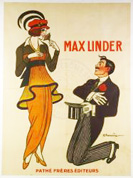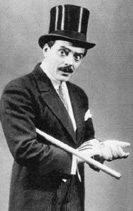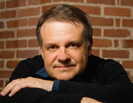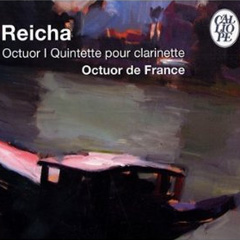Hommage to Max Linder

- Production : France, 1910-1913
- Length : 70 min at 24 frames/second
- Orchestration : 2 Violins, Viola, Cello, Double Bass, Clarinet, Bassoon, French Horn, Piano, Percussion
Scenario :
Max se trompe d’étage
France 1911 – 06’
Max goes back home one night but forgets to stop at his parents’ flat. He continues floor after floor until he reaches the roof…
Max en convalescence
France 1911 – 09’
Max goes back home after a surgical operation. There he meets up with his parents, his sister his dog and his pony…
Max veut grandir
France 1911 – 15’
Max is in love with a woman who only wants to marry a giant… Max à Monaco
France 1913 – 15’
The burlesque adventures of a drunken man aboard a yacht…
Max et la doctoresse
France 1914 – 15’
Max is married to a doctor. Each time he wants to take her in his arms, she is called away to treat a patient…
Max n’aime pas les chats
France 1913 – 12’
Max is engaged to a young woman whose life revolves around her cat. Unable to bear playing second fiddle to the cat, he hides it in the piano…
The Director :
Max Linder
 Max Linder, whose real name is Gabriel Maximilien Leuvielle, was born in Gironde in 1883. Very young, he enrolled at the Bordeaux Conservatoire and tackled the timeless classics under the stage name of Lacerda. Reaching Paris in 1904, he played small parts at the Ambigu and the Variétés, before making his cinema debut with Pathé in 1905. He soon specialised in comedy where a huge success awaited him. After a few burlesque sketches, he invented « Max », a young, elegant dandy, boastful and inclined towards the fair sex. always involved in comical adventures which he masters with panache.
Max Linder, whose real name is Gabriel Maximilien Leuvielle, was born in Gironde in 1883. Very young, he enrolled at the Bordeaux Conservatoire and tackled the timeless classics under the stage name of Lacerda. Reaching Paris in 1904, he played small parts at the Ambigu and the Variétés, before making his cinema debut with Pathé in 1905. He soon specialised in comedy where a huge success awaited him. After a few burlesque sketches, he invented « Max », a young, elegant dandy, boastful and inclined towards the fair sex. always involved in comical adventures which he masters with panache.
He was in turn conjuror, tango teacher, torero, chiropodist, maître d’hôtel, accidental doctor, etc… All these films, often written and directed by him, brought him world-wide fame and in 1916, they earned him an offer to work in the United States.
Victim of several accidents, he became weaker and weaker. This period saw the making of his rare feature length films. His last film was King of the Circus, made in Austria in 1924.
On 30th October 1925, he took his own life, together with that of his young wife, in a Paris hotel room. Maw Linder’s contribution to the still young comic genre was huge. From Chaplin to Pierre Etaix, all the great film comedians owe him something.
(We thank the organisers of the Diractors International Film Festival, Luxembourg, who gave us atuthority to use these extracts from thier 2008 catalogue)
The Composer :
Gabriel Thibaudeau
 Born in 1959 in Beauharnois, Quebec, Gabriel Thibaudeau studied piano at the Vincent d’Indy Music School and composition at the Music Faculty of Montreal University. He also participated in summer schools at the Orford Arts Center where he worked on composition with Iannis Xenakis.
Born in 1959 in Beauharnois, Quebec, Gabriel Thibaudeau studied piano at the Vincent d’Indy Music School and composition at the Music Faculty of Montreal University. He also participated in summer schools at the Orford Arts Center where he worked on composition with Iannis Xenakis.
As permanent pianist at the Quebec Film Library since 1988, and recognised as the Canadian specialist in the accompanying of silent movies, he has been invited since 1991 to the Gionarte del Cinema Muto, in Pordenone and since 1992 to the festival Il Cinema Ritrovato, in Bologna, Italy.
Since 1993, among other works for the silent cinema, he has composed a quintet for brass and percussion for the film Straight Shooting, a concerto for piano and chamber orchestra for the film The Fall of the House of Usher, a sextet for the film Foolish Wives, and a Requiem for soprano and piano for the film The Hunchback of Notre-Dame. In association with the Octuor de France he has composed the music to accompany The Man who Laughs, Au Bonheur des Dames, The Iron Mask and Poil de Carotte, as well as adapting for the Octuor de France his orchestral score for The Phantom of the Opera.
 English
English Français
Français











